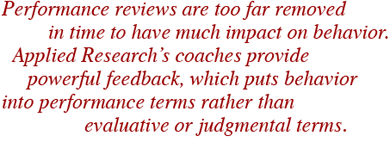| Case Study |
Executive Coaching
Can You Hear Me Now?SM Long-Distance Coaching Generates Long-Lasting Collaborative Communication Results
Is it actually possible to change executive behavior over the telephone?
Applied Research Corporation, experts in strengthening organizational performance by developing individual leadership potential, says yes. By putting their outstanding coaching programs and know-how into action, they helped a major pharmaceutical company to develop a high-potential leader in Latin America.
Seen as having the potential to move from marketing to general management, constructive problem solving was an ongoing issue for this executive and her manager was not an effective role model to help facilitate her growth. Her abrasive communication style and related behaviors thwarted the productivity of her team, creating conflict with cross-functional peers and suppliers. Yet, she was not fully aware of how her extreme avoidance and aggressive behaviors limited her influence and ability to build work relationships and achieve results. Applied Research Corporation set a course of remediation - given the distance, primarily delivered via telephone coaching - to help her to see the negative impact of her behavior on others and the business' goals.

Telephone coaching can be somewhat challenging, since the coach lacks the opportunity to observe the individual's workplace interaction with others. That was not an issue for Applied Research. With decades of leadership assessment and coaching experience, dealing with a long distance cross-cultural coaching assignment drew upon their vast expertise helping multinational companies build effective leaders. In this case, the first step was to help the executive determine the benefits of changing her communication style for herself, from both a business and personal perspective. The Applied Research Corporation coach helped her paint the image of how she wanted to be perceived in the workplace - as an admired leader who motivated her team to produce their best possible work - and how she would benefit from making changes to her current brusque communication style, which only served to increase her stress and frustration.
Applied Research Corporation understands that executives are already under tremendous pressure to perform. Regardless of distance, if coaching is to be effective and a true catalyst for change, well-defined, measurable objectives are important. In this case, the executive was given learning goals and behavioral metrics were established to ascertain the effectiveness of her progress. Communication techniques, such as allowing others to state their opinions first and focusing on using process leadership skills like active listening and asking open-ended questions to understand and clarify points of view, were part of the learning program.
Systematically designed, Applied Research's coaching was delivered in three phases. First, the executive was asked to read a text chosen by Applied Research on the topic of having difficult conversations. Then, during the telephone coaching sessions, the executive was asked to reflect on how she could have applied new communications skills to earlier workplace incidents. During the final phase of the coaching engagement, which lasted six months, Applied Research aggressively worked with her to apply her new leadership skills to current situations. Since the exercises were practical and non-invasive to the executive's already busy day, she was able to easily incorporate them into her daily routine. Within months, she was seeking to understand others first rather than immediately defending and pushing her own ideas.
The result: by encouraging others to contribute new ideas, this executive has significantly elevated her group's productivity and diminished conflicts. Now, she tempers her strong desire to immediately act with good listening skills that include asking the right questions to uncover new information and then considers the longer-term implications of that information. She demonstrates to others that she values their input and encourages them to contribute new ideas, commenting that giving control to others was actually very empowering. Her team and peers now view her as more collaborative leader who has created better workforce alignment with the pursuit of the organization's strategic agenda.
Evidence of these improvements and their impact on the bottom line was noticeable. First, there was anecdotal proof from her manager, who observed her more positive interaction style with subordinates and peers. He also commented that she was a stronger leader. A regional executive supported these observations. The HR director also shared feedback, indicating an overall improvement in the team's "climate," motivation, and espirit de corp.
Quantitatively, her scores on six key interpersonal items in a 360-degree feedback review moved from needs improvement to effective or highly effective.
Highly motivated from the start, this executive understood that she had been singled out by her organization for this level of leadership development. As Applied Research knows, impact coaching requires total commitment on the part of all participants, especially long-distance. In this case, the coach did not meet face-to-face with the executive he was coaching for six months, however, by then, the behavioral changes defined at the beginning of the program were already well underway. And this pharmaceutical company - that advocates helping good people get even better - has gained a solid leader ready to move to the next level - general management with P&L responsibility. |
When the world's largest research-based pharmaceutical company wanted to develop its global high-potential executive talent, it turned to Applied Research Corporation. With more than 120,000 employees worldwide, this company needed a coaching partner with global experience and skills so effective that distance would not be an impediment to success.
Coaching Model:
Impact Coaching
Length of Program:
6 months
Program Components:
Succession Planning, 360-degree feedback, executive coaching |